精选原创新课堂浙江专用2017春八年级英语下册Unit1What'sthematter综合水平测试新版人教新目标版
- 格式:docx
- 大小:20.44 KB
- 文档页数:8
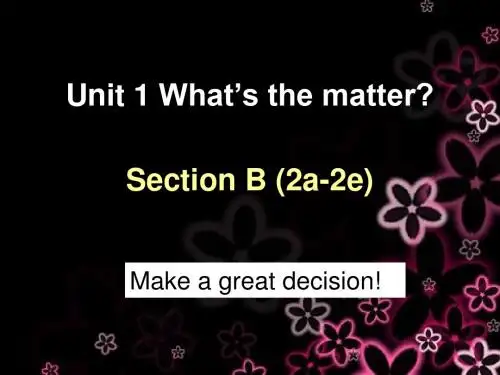
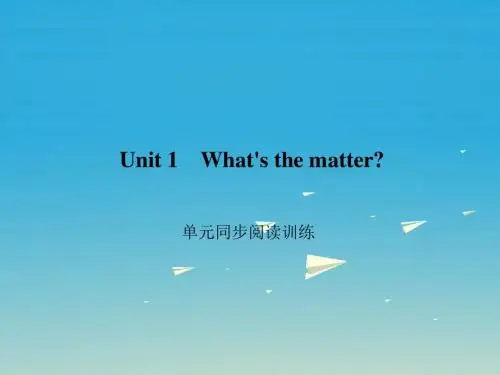
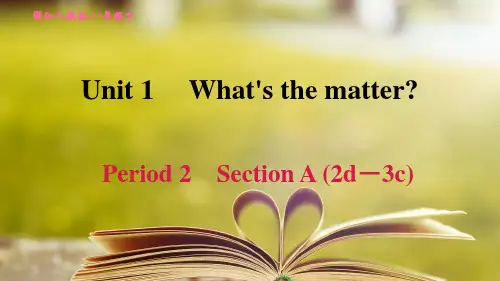
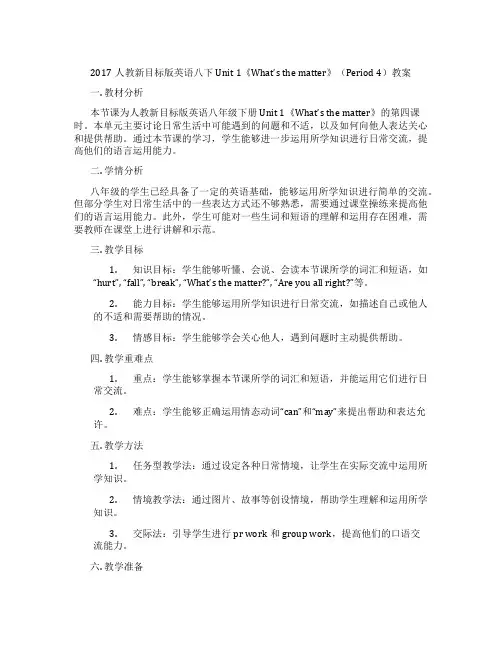
2017人教新目标版英语八下Unit 1《What’s the matter》(Period 4)教案一. 教材分析本节课为人教新目标版英语八年级下册Unit 1《What’s the matter》的第四课时。
本单元主要讨论日常生活中可能遇到的问题和不适,以及如何向他人表达关心和提供帮助。
通过本节课的学习,学生能够进一步运用所学知识进行日常交流,提高他们的语言运用能力。
二. 学情分析八年级的学生已经具备了一定的英语基础,能够运用所学知识进行简单的交流。
但部分学生对日常生活中的一些表达方式还不够熟悉,需要通过课堂操练来提高他们的语言运用能力。
此外,学生可能对一些生词和短语的理解和运用存在困难,需要教师在课堂上进行讲解和示范。
三. 教学目标1.知识目标:学生能够听懂、会说、会读本节课所学的词汇和短语,如“hurt”, “fall”, “break”, “What’s the matter?”, “Are you all right?”等。
2.能力目标:学生能够运用所学知识进行日常交流,如描述自己或他人的不适和需要帮助的情况。
3.情感目标:学生能够学会关心他人,遇到问题时主动提供帮助。
四. 教学重难点1.重点:学生能够掌握本节课所学的词汇和短语,并能运用它们进行日常交流。
2.难点:学生能够正确运用情态动词“can”和“may”来提出帮助和表达允许。
五. 教学方法1.任务型教学法:通过设定各种日常情境,让学生在实际交流中运用所学知识。
2.情境教学法:通过图片、故事等创设情境,帮助学生理解和运用所学知识。
3.交际法:引导学生进行pr work和group work,提高他们的口语交流能力。
六. 教学准备1.教学课件:制作包含本节课所学的词汇和短语的课件。
2.图片:准备一些与本节课主题相关的图片,如受伤的人、摔倒的人等。
3.故事:编写一个与本节课主题相关的小故事,用于引入新知识。
七. 教学过程1.导入(5分钟)教师通过展示一些受伤的人或摔倒的人的图片,引导学生谈论日常生活中遇到的问题和不适。
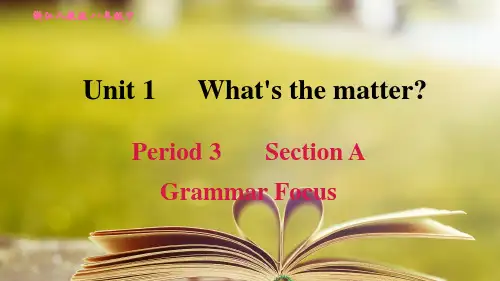
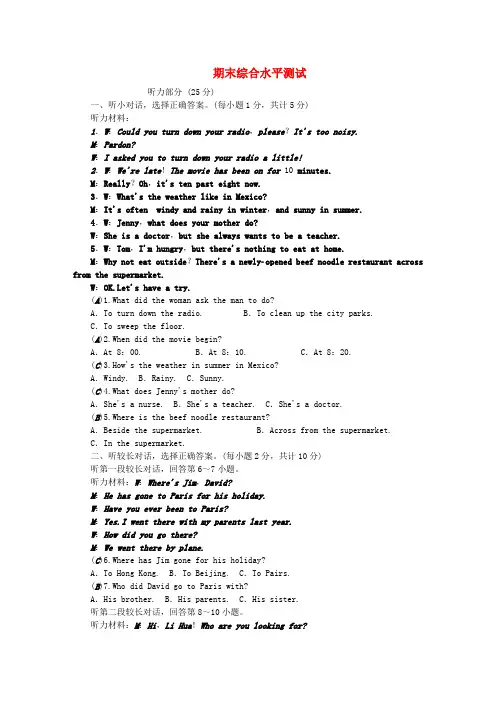
期末综合水平测试听力部分 (25分)一、听小对话,选择正确答案。
(每小题1分,共计5分)听力材料:1.W:Could you turn down your radio,please?It's too noisy.M:Pardon?W:I asked you to turn down your radio a little!2.W:We're late!The movie has been on for 10 minutes.M:Really?Oh,it's ten past eight now.3.W:What's the weather like in Mexico?M:It's often windy and rainy in winter,and sunny in summer.4.W:Jenny,what does your mother do?W:She is a doctor,but she always wants to be a teacher.5.W:Tom,I'm hungry,but there's nothing to eat at home.M:Why not eat outside?There's a newlyopened beef noodle restaurant across from the supermarket.W:OK.Let's have a try.(A)1.What did the woman ask the man to do?A.To turn down the radio. B.To clean up the city parks.C.To sweep the floor.(A)2.When did the movie begin?A.At 8:00. B.At 8:10. C.At 8:20.(C)3.How's the weather in summer in Mexico?A.Windy. B.Rainy. C.Sunny.(C)4.What does Jenny's mother do?A.She's a nurse. B.She's a teacher. C.She's a doctor.(B)5.Where is the beef noodle restaurant?A.Beside the supermarket. B.Across from the supermarket.C.In the supermarket.二、听较长对话,选择正确答案。
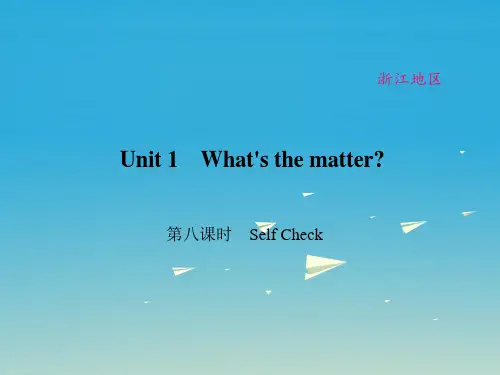
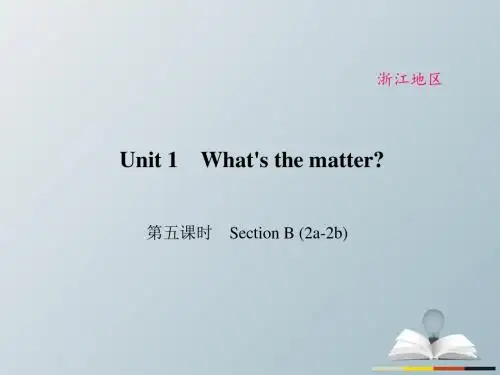
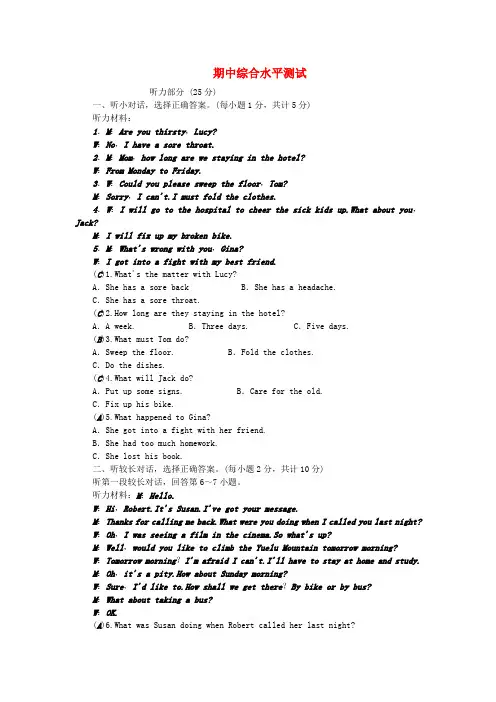
期中综合水平测试听力部分 (25分)一、听小对话,选择正确答案。
(每小题1分,共计5分)听力材料:1.M:Are you thirsty,Lucy?W:No,I have a sore throat.2.M:Mom,how long are we staying in the hotel?W:From Monday to Friday.3.W:Could you please sweep the floor,Tom?M:Sorry,I can't.I must fold the clothes.4.W:I will go to the hospital to cheer the sick kids up.What about you,Jack?M:I will fix up my broken bike.5.M:What's wrong with you,Gina?W:I got into a fight with my best friend.(C)1.What's the matter with Lucy?A.She has a sore back B.She has a headache.C.She has a sore throat.(C)2.How long are they staying in the hotel?A.A week. B.Three days. C.Five days.(B)3.What must Tom do?A.Sweep the floor. B.Fold the clothes.C.Do the dishes.(C)4.What will Jack do?A.Put up some signs. B.Care for the old.C.Fix up his bike.(A)5.What happened to Gina?A.She got into a fight with her friend.B.She had too much homework.C.She lost his book.二、听较长对话,选择正确答案。
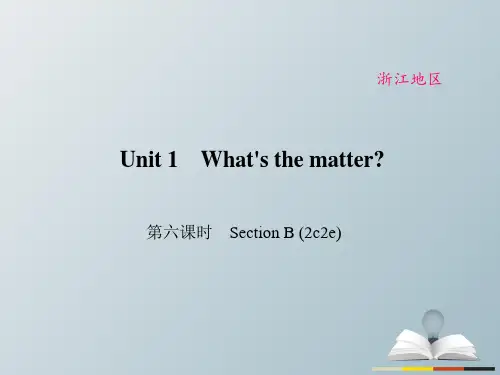
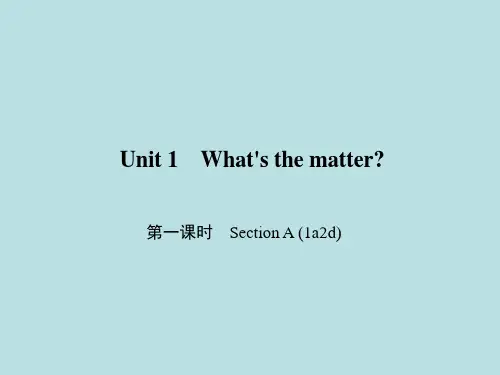
(浙江专版)2017八年级英语下册Unit 1 What’s the matter Period 3教案(新版)人教新目标版编辑整理:尊敬的读者朋友们:这里是精品文档编辑中心,本文档内容是由我和我的同事精心编辑整理后发布的,发布之前我们对文中内容进行仔细校对,但是难免会有疏漏的地方,但是任然希望((浙江专版)2017八年级英语下册Unit 1 What’s the matter Period 3教案(新版)人教新目标版)的内容能够给您的工作和学习带来便利。
同时也真诚的希望收到您的建议和反馈,这将是我们进步的源泉,前进的动力。
本文可编辑可修改,如果觉得对您有帮助请收藏以便随时查阅,最后祝您生活愉快业绩进步,以下为(浙江专版)2017八年级英语下册Unit 1 What’s the matter Period 3教案(新版)人教新目标版的全部内容。
Unit 1. what’s the matter?Period3 SectionB 1a—1d【教学目标】知识与技能(1)熟练掌握下列词汇:bandage sick knee nosebleed hurt hit breathing sunburned ourselves (2)熟练掌握下列短语:get sunburned feel sick get hit on the head put a bandage on…put one’s head back put on a clean shirt have a nosebleed(3)掌握下列句型:What’s the matter with…?What should I/ you/ he/ she/they…do?I/ you/ he/ she/they should do…?I have a headache/stomachache/toothache。
Does she/he/ have a fever/cold/toot hache…?过程与方法图片和短语搭配,听力练习,role—play情感、态度与价值观引导学生正确面对生活中遇到的困难,爱惜身体,坚持锻炼.【教学重难点】重点:Should的用法难点:教材中出现的词组的掌握以及对听力材料的理解。
(浙江专版)2017八年级英语下册Unit 1 What’s the matter Period 2教案(新版)人教新目标版编辑整理:尊敬的读者朋友们:这里是精品文档编辑中心,本文档内容是由我和我的同事精心编辑整理后发布的,发布之前我们对文中内容进行仔细校对,但是难免会有疏漏的地方,但是任然希望((浙江专版)2017八年级英语下册Unit 1 What’s the matter Period 2教案(新版)人教新目标版)的内容能够给您的工作和学习带来便利。
同时也真诚的希望收到您的建议和反馈,这将是我们进步的源泉,前进的动力。
本文可编辑可修改,如果觉得对您有帮助请收藏以便随时查阅,最后祝您生活愉快业绩进步,以下为(浙江专版)2017八年级英语下册Unit 1 What’s the matter Period 2教案(新版)人教新目标版的全部内容。
Unit 1。
what’s the matter?Period2 SectionA 3a-4c【教学目标】知识与技能(1)熟练掌握下列词汇:passenger,trouble,hit, herself,(2)熟练掌握下列短语:hurt oneself, have a sore throat ,put some medicine on… ,take one’s temperature,get off, to one’s surprise,right away, get into,see sb doing sth, thanks to, Fall down ,lie down,save a life,think about,in time,wait for, take …to…,tell …to do …(3)掌握下列句型:Are you OK? Do you have a fever? Yes, I do. /No,I don’t。
What should she do? She should take her temperature。
Unit 1 综合水平测试听力部分 (25分)一、听小对话,选择正确答案。
(每小题1分,共计5分)听力材料:1.M:You don't look well.Do you have a fever?W:No,I don't.I think I have got a little cold,and I have a sore throat. 2.M:Oh,no!What happened?W:I was making dinner just now and I cut myself by accident.3.M:What's wrong with your brother,Lily?W:He has a sore left leg,Peter.4.M:Should I take medicine three times a day,doctor?W:No,Tom.Just take it twice a day.5.M:I sleep eleven hours every night,but I'm often tired.Why?W:Maybe you sleep too much.You should get up early and exercise every day.(B)1.What's wrong with the girl?A.She has a fever. B.She has a cold.C.She has a sore back.(A)2.What happened to Mary?A.She cut herself. B.She fell down.C.She had a nosebleed.(B)3.Who has a sore left leg?A.Lily. B.Lily's brother. C.Peter.(B)4.How often should Tom take the medicine?A.Once a day. B.Twice a day.C.Three times a day.(B)5.What should the boy do?A.Sleep a lot every night. B.Take more exercise.C.Get up late.二、听较长对话,选择正确答案。
(每小题2分,共计10分)听第一段较长对话,回答第6~7小题。
听力材料:W:Is everyone here today?M:No,Tom and Mike aren't.W:Where are they?M:Tom wasn't feeling well,so Mike took him to the hospital.(C)6.Where are they probably talking?A.In the street. B.In the hospital.C.In the classroom.(B)7.Who is sick?A.Mike. B.Tom. C.Mike and Tom.听第二段较长对话,回答第8~10小题。
听力材料:W:What's the matter,young man?M:I don't feel well.I have a headache.W:When did it start?M:This morning.Oh,yesterday evening.W:Let me have a look.Open your mouth.It's just a cold.You should get some rest.M:Do I have to take any medicine?W:No,just some time in bed will be fine.M:Thank you.W:You are welcome.(A)8.What's the matter with the boy?A.He has a headache. B.He has a toothache.C.He has a sore throat.(B)9.When did the problem start?A.This morning. B.Yesterday evening.C.Yesterday morning.(A)10.What does the doctor tell the boy to do?A.Get some rest. B.Take some medicine.C.Go to see a dentist.三、听独白,选择正确答案。
(每小题2分,共计10分)听力材料:Mr.Brown is a good doctor.Four people came to meet him this morning.Mr.Brown gave them different medicines and suggestions.Alice has a cold.She needs to take medicine twice a day and drink more water.Tom has a sore back.He needs to take medicine once a day and lie on the bed to have a good rest.Bob has a headache.He needs to take medicine three times a day and go to bed early.Mary has a sore throat.She needs to take medicine twice a day and drink hot tea with honey.(B)11.Where does Mr.Brown work?A.In a school. B.In a hospital. C.In a restaurant.(B)12.What's the matter with Alice?A.She has a sore back. B.She has a cold.C.She has a headache.(C)13.How often should Tom take medicine?A.Three times a day. B.Twice a day.C.Once a day.(C)14.Who has a sore throat?A.Tom. B.Bob. C.Mary.(A)15.What else should Mary do?A.Drink hot tea with honey. B.Have a good rest.C.Drink more water.笔试部分 (95分)四、完形填空。
(每小题1分,共计15分)Hearing is very important to all of us.We can __16__beautiful music,nice songs of birds,the laughter of people or other different kinds of __17__ in the world with our ears.__18__ we must try to protect our ears.The following will tell you __19__ protect ears.Listening to __20__ music a lot can be bad for ears,__21__ when headphones (耳机)are used.So try not to wear headphones or __22__the volume (音量)when you're wearing headphones.You should give your ears a rest if you like wearing headphones.Before swimming,remember __23__earplugs (耳塞)into your ears or wear a swim hat to stop water __24__ into your ears.If you are going to a concert,wear earplugs to protect your ears __25__ the terrible music!__26__,special earplugs can be made for you if you go to concerts a lot or if you are a musician yourself.See a doctor if your ears __27__.__28__ some medicine if the doctor asks you to do so.__29__the advice above now and you won't be saying “What?” when you are getting __30__.(B)16.A.listen B.hear C.listening D.hear of(A)17.A.sounds B.noise C.voices D.barks(C)18.A.Because B.Although C.So D.But(D)19.A.what B.how C.what to D.how to(A)20.A.loud B.aloud C.loudly D.quiet(B)21.A.specially B.especially C.special D.especial(C)22.A.turn on B.turn off C.turn down D.turn up(B)23.A.put B.to put C.putting D.to putting(D)24.A.get B.to get C.with getting D.from getting(B)25.A.for B.from C.with D.at(A)26.A.In fact B.In short C.In general D.In a word(B)27.A.break B.hurt C.ill D.sick(C)28.A.Drink B.Eat C.Take D.Have(C)29.A.Listen B.Hear C.Follow D.Fetch(B)30.A.young B.old C.sick D.tired五、阅读理解。